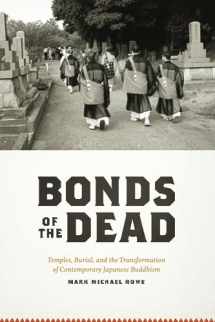
Bonds of the Dead: Temples, Burial, and the Transformation of Contemporary Japanese Buddhism (Buddhism and Modernity)
Book details
Summary
Description
Despite popular images of priests seeking enlightenment in snow-covered mountain temples, the central concern of Japanese Buddhism is death. For that reason, Japanese Buddhism’s social and economic base has long been in mortuary services—a base now threatened by public debate over the status, treatment, and location of the dead. Bonds of the Dead explores the crisis brought on by this debate and investigates what changing burial forms reveal about the ways temple Buddhism is perceived and propagated in contemporary Japan.
Mark Rowe offers a crucial account of how religious, political, social, and economic forces in the twentieth century led to the emergence of new funerary practices in Japan and how, as a result, the care of the dead has become the most fundamental challenge to the continued existence of Japanese temple Buddhism. Far from marking the death of Buddhism in Japan, Rowe argues, funerary Buddhism reveals the tradition at its most vibrant. Combining ethnographic research with doctrinal considerations, this is a fascinating book for anyone interested in Japanese society and religion.


We would LOVE it if you could help us and other readers by reviewing the book
Book review



